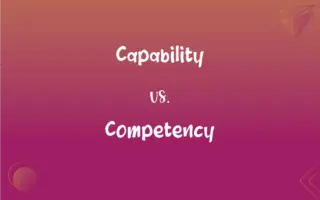Accounting vs. Accountancy: What's the Difference?
Edited by Janet White || By Harlon Moss || Published on November 10, 2023
Accounting refers to the process of recording, analyzing, and reporting financial transactions, whereas accountancy is the broader field encompassing accounting practices, principles, and the profession.

Key Differences
Accounting is the actual process of managing financial information, involving tasks like bookkeeping, preparing financial statements, and auditing. Accountancy is the wider discipline that includes not just accounting practices, but also the principles, ethics, and professional standards of the field.
The term accounting often refers to the day-to-day work of managing financial records and reports. Accountancy, on the other hand, represents the entire scope of the profession, including education, regulation, and different areas of practice like tax and audit.
Professionals engaged in accounting are focused on the practical application of financial management techniques. In contrast, accountancy covers the broader spectrum, including the development of accounting theories, methodologies, and the framework of the accounting profession.
Accounting is typically seen as a subset within the larger umbrella of accountancy. While accounting deals with the hands-on aspect of financial record-keeping, accountancy encompasses the theoretical underpinnings and the professional industry as a whole.
In education and career terms, accounting often refers to specific roles or functions within a company or organization. Accountancy, conversely, can refer to the entire field, including education, certification, and professional bodies associated with the accounting profession.
ADVERTISEMENT
Comparison Chart
Definition
Process of recording and reporting financial transactions
Broader field encompassing accounting practices and principles
Scope
Focused on practical financial management
Includes theoretical, ethical, and professional standards
In Profession
Specific roles or functions in financial management
Entire professional field, including regulation and education
Application
Day-to-day financial record-keeping
Development of theories and methodologies
Educational Context
Often specific courses or programs within accountancy
Broader educational field, including certifications
ADVERTISEMENT
Accounting and Accountancy Definitions
Accounting
Management of financial information and reports.
Accounting for the quarterly sales was his primary responsibility.
Accountancy
Broad discipline including tax, audit, and consulting.
His firm offered a range of services in accountancy.
Accounting
The process of recording financial transactions.
She excelled in accounting for the company's expenditures.
Accountancy
Study and application of accounting theories.
Accountancy programs often include advanced theoretical courses.
Accounting
The practice of bookkeeping and auditing.
Accounting ensured the financial transparency of the organization.
Accountancy
Regulatory and educational framework of accounting.
He contributed to the development of accountancy regulations
Accounting
Analysis of financial data for decision-making.
Accurate accounting is crucial for budget planning.
Accountancy
The profession encompassing accounting practices.
She pursued a career in accountancy after graduation.
Accounting
Preparation of financial statements.
He specialized in accounting for multinational corporations.
Accountancy
Field involving financial principles and ethics.
Accountancy is guided by strict professional standards.
Accounting
The practice or profession of maintaining the financial records of a business, including bookkeeping as well as the preparation of statements concerning the assets, liabilities, and operating results.
Accountancy
One that keeps, audits, and inspects the financial records of individuals or business concerns and prepares financial and tax reports.
Accounting
Present participle of account
Accountancy
The function of compiling and providing financial information primarily by reports referred to as financial statements, including bookkeeping, systems design, analysis and interpretation of accounting information.
Accountancy
A company or organisation that performs such a function.
Accountancy
The art or employment of an accountant.
Accountancy
The occupation of maintaining and auditing records and preparing financial reports for a business
FAQs
Can you work in accounting without an accountancy degree?
Yes, but an accountancy degree is often preferred or required for advanced roles.
Are all accountants auditors?
No, auditing is just one specialization within accountancy.
Does accounting always involve mathematics?
Yes, accounting typically involves working with numbers and financial data.
Are accounting jobs in demand?
Yes, accounting is generally a stable and in-demand profession.
Is forensic accounting a part of accountancy?
Yes, forensic accounting is a specialized area within accountancy.
Can accountancy lead to executive roles?
Yes, accountancy can be a pathway to executive and leadership positions.
Is financial analysis part of accounting?
Yes, financial analysis is an important aspect of accounting.
Is accounting the same as accountancy?
No, accounting is a part of accountancy, which is the broader field.
Is accountancy just about taxes?
No, it includes taxes but also covers other areas like auditing and consulting.
Does accountancy require certification?
For certain roles, like Certified Public Accountant (CPA), certification is required.
Is accounting software part of accounting?
Yes, accounting software is a tool used in the accounting process.
Do accountants need to be good communicators?
Yes, effective communication is important in accounting and accountancy.
Are internships important in accounting?
Yes, internships can provide valuable practical experience.
Is accounting just about numbers?
While focused on numbers, accounting also involves analysis and strategy.
Are accountancy courses difficult?
Difficulty can vary, but accountancy does require dedication and study.
Is accounting a good career for problem-solving?
Yes, accounting often involves problem-solving and analytical skills.
Can accountancy be self-taught?
While basic principles can be self-taught, professional accountancy often requires formal education.
Are accounting principles universal?
While there are international standards, accounting practices can vary by country.
Does accountancy involve financial planning?
Yes, accountancy can involve aspects of financial planning.
Can accountants work in different industries?
Yes, accountants can work in a wide range of industries.
About Author
Written by
Harlon MossHarlon is a seasoned quality moderator and accomplished content writer for Difference Wiki. An alumnus of the prestigious University of California, he earned his degree in Computer Science. Leveraging his academic background, Harlon brings a meticulous and informed perspective to his work, ensuring content accuracy and excellence.
Edited by
Janet WhiteJanet White has been an esteemed writer and blogger for Difference Wiki. Holding a Master's degree in Science and Medical Journalism from the prestigious Boston University, she has consistently demonstrated her expertise and passion for her field. When she's not immersed in her work, Janet relishes her time exercising, delving into a good book, and cherishing moments with friends and family.































































